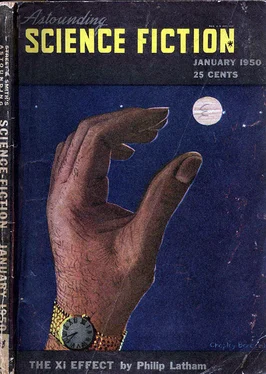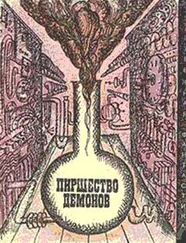Роберт Ричардсон - The Xi Effect
Здесь есть возможность читать онлайн «Роберт Ричардсон - The Xi Effect» весь текст электронной книги совершенно бесплатно (целиком полную версию без сокращений). В некоторых случаях можно слушать аудио, скачать через торрент в формате fb2 и присутствует краткое содержание. Город: New York, Год выпуска: 1950, Издательство: John Wood Campbell, Jr., Жанр: Фантастика и фэнтези, на английском языке. Описание произведения, (предисловие) а так же отзывы посетителей доступны на портале библиотеки ЛибКат.
- Название:The Xi Effect
- Автор:
- Издательство:John Wood Campbell, Jr.
- Жанр:
- Год:1950
- Город:New York
- ISBN:нет данных
- Рейтинг книги:4 / 5. Голосов: 1
-
Избранное:Добавить в избранное
- Отзывы:
-
Ваша оценка:
- 80
- 1
- 2
- 3
- 4
- 5
The Xi Effect: краткое содержание, описание и аннотация
Предлагаем к чтению аннотацию, описание, краткое содержание или предисловие (зависит от того, что написал сам автор книги «The Xi Effect»). Если вы не нашли необходимую информацию о книге — напишите в комментариях, мы постараемся отыскать её.
The Xi Effect — читать онлайн бесплатно полную книгу (весь текст) целиком
Ниже представлен текст книги, разбитый по страницам. Система сохранения места последней прочитанной страницы, позволяет с удобством читать онлайн бесплатно книгу «The Xi Effect», без необходимости каждый раз заново искать на чём Вы остановились. Поставьте закладку, и сможете в любой момент перейти на страницу, на которой закончили чтение.
Интервал:
Закладка:
Stoddard classified Friedmann as predominantly Type A with a few overtones of Type B thrown in. He was a tall, thin man of about thirty, with sharp angular features, and a way of looking at you as if his eyes were focused on a point ten feet behind your back. His voice was dry and flat with the barest trace of foreign accent.
Stoddard had not listened for more than five minutes before he began to experience the same sense of bewilderment that little Dorothy must have felt on her first trip to the land of Oz. As nearly as he could gather, Friedmann considered the familiar everyday world to constitute merely a tiny corner or “clot” in a vastly higher order of space-time or “Xi space.” Ordinarily, events in the Xi space are on too gross a scale to exert a sensible effect on the fine-grained clot space. On rare occasions, however, a clot might be seriously disturbed by events of an exceptional nature in the Xi space, in somewhat the same way that the atoms on the surface of a stick of amber may be disturbed by rubbing it vigorously. When events in the super-cosmos happen to intrude upon an individual clot extraordinary results ensue; for example, angular momentum is not strictly conserved, and Hamilton’s equations require modification, to mention only a few.
“Thus for a properly oriented observer the universe must at all times have a radius equal to tau times the velocity of light,” said Friedmann, by way of conclusion. “Hence, if tau increases uniformly we must of necessity have the expanding universe as shown by the general recession of the extragalactic nebulae.”
“But this increase in tau time is not really uniform but a statistical effect. Local fluctuations in the Xi space may attain such magnitude—as to become distinctly perceptible in clot space. Evidence for the Xi effect in our vicinity is shown by the behavior of the Andromeda nebula, which instead of sharing in the general recession is approaching the Earth at three hundred kilometers per second. Again, certain anomalies in the motion of the inner planets, notably the secular variation in the node of Venus [1] The outstanding difference between gravitational theory and observation is the well-known discrepancy of 43" per century in the motion of the perihelion of Mercury. Einstein's explanation of this discrepancy was considered a triumph for relativity. The next largest difference between gravitational theory and observation is the secular variation of 13" per century in the node of Venus, which has not been explained by relativity. See Journal of the Optical Society of America , vol. 30, p. 225, 1930.
, clearly indicate encroachment of the Xi effect within the confines of our own solar system. Further anomalies of increasing magnitude may be anticipated.”
With a curt nod he gathered together his papers and sat down abruptly, scarcely bothering to acknowledge the prolonged applause from the student section. The secretary of the Astronomy and Physics Club thanked Dr. Friedmann for his address which he was sure they had all enjoyed, and inquired if there were any questions. This announcement was followed by the customary minute of awkward silence. Finally the spell was broken by Fosberg, an authority on the theory of numbers and uncrowned king of the faculty’s eccentric characters.
“As I get it, this postulated Xi effect started a shrinkage m our sector about ten-to-the-ninth years ago. Now then, I’ve just been doing some figuring on the back of this envelope and if I haven’t made a mistake the present diameter of the solar system out to Pluto is 3.2 X 10 8kilometers, or about two hundred million miles. Is that right?” Everyone looked expectantly at the speaker.
“I work entirely with the generalized formulate; never with numerical values,” Friedmann replied with cold dignity. “However, I do not question the accuracy of Dr. Fosberg’s arithmetic. Naturally the shrinkage would be quite imperceptible with ordinary measuring rods. It would be necessary to make some observation involving explicitly the velocity of light.”
“I’m willing to grant you that,” Fosberg returned, “but aren’t you going to get into serious trouble with the law of gravitation due to all this shrinkage? Why, in a few more years the congestion in the solar system will be worse than the campus parking problem!” It was a remark that was always good for a laugh and one of the principal reasons he had asked the question in the first place.
“The gravitational difficulties that so worry Dr. Fosberg do not follow as a necessary consequence,” said Friedmann, entirely unruffled. “As I have demonstrated, the laws of Newtonian mechanics may fail to hold even as a first approximation. At these extreme limits, however, the integration of the equations becomes quite insuperable by ordinary methods. One of my pupils at the University of Pennsylvania plans to explore these regions next year with the EDVAC.”
Fosberg wagged his bald head. “Just the same all this crowding together still worries me,” he declared. “And I don’t like the idea of being reduced to the size of a microcosmic midget either.”
Friedmann’s shrug plainly indicated that it was a matter of complete indifference to him if Fosberg were reduced to the dimensions of a neutrino, and as there were no more questions, the meeting broke up. Stoddard, who had grown thoroughly bored with the whole proceedings, made a bolt for the door but Arnold was only a few lengths behind.
“Wasn’t Friedmann good,” he demanded. “Don’t you think it’s the most satisfying cosmological theory you ever heard?”
“No doubt about it,” said Stoddard, continuing on down the hall.
“You know, I was thinking,” Arnold went on, falling into step beside him, “why couldn’t we test the Xi effect ourselves?”
“Test it ourselves!”
“Why not? After all, it shouldn’t be too difficult. As Friedmann said, we would only need to make some observation that depends explicitly on the velocity of light.”
Stoddard snorted. “Bet he’s never made a bona fide observation in his whole life.”
They stopped on the steps outside Dickinson Hall before wending their separate ways homeward. The sun, had set and a slight breeze was beginning to stir the leaves of the giant oak tree ac the entrance.
“Well, the next time you're in my office we'll have a long talk about it,” said Stoddard, edging down the steps. “But right now I've got to get home for dinner.”
“The observation would consist simply in determining whether some distant event occurred at the time predicted,” Arnold mused. “Let’s see, what would be the easiest thing to observe?”
At that instant his eye was attracted to a star faintly visible near the eastern horizon. “I’ve got it!” he cried. “We could observe an eclipse of one of Jupiter's satellites. If the solar system has really shrunk as much as the Xi effect predicts, it should occur way ahead of time.”
“You mean do a kind of repeat on Rocmer’s work,” said Stoddard, “only with a light time corresponding to the whole distance to Jupiter instead of the diameter of the Earth’s orbit?”
“Exactly!”
Stoddard could feel the net closing around him. He knew that once his partner in crime became infatuated with an idea it was useless to try to discourage him. “Well, I guess we’ve looked for less hopeful things. Only I can’t seem to remember what they were.”
“Listen,” said Arnold, his eyes shining, “is there a class at the ten-inch tonight?”
Stoddard considered, “This is Wednesday, isn’t it? Nope, don’t think there will be one.”
“Then what’s to stop us from making the observation right now—tonight?”
“Nothing, so far as I know, except maybe a nice thick fog.” He heaved a sigh of resignation. “Come on, let’s take a look at the Ephemeris . Maybe there aren't any eclipses tonight.”
Читать дальшеИнтервал:
Закладка:
Похожие книги на «The Xi Effect»
Представляем Вашему вниманию похожие книги на «The Xi Effect» списком для выбора. Мы отобрали схожую по названию и смыслу литературу в надежде предоставить читателям больше вариантов отыскать новые, интересные, ещё непрочитанные произведения.
Обсуждение, отзывы о книге «The Xi Effect» и просто собственные мнения читателей. Оставьте ваши комментарии, напишите, что Вы думаете о произведении, его смысле или главных героях. Укажите что конкретно понравилось, а что нет, и почему Вы так считаете.












